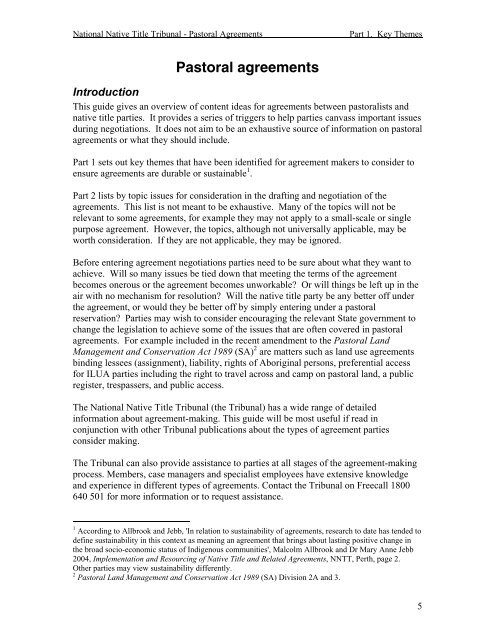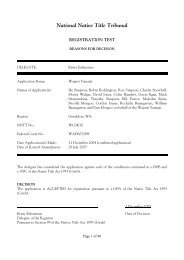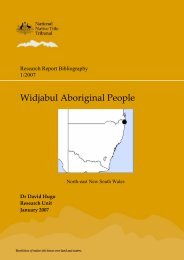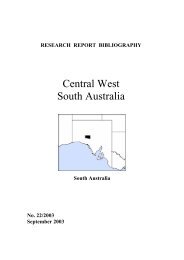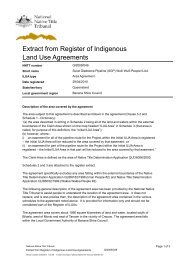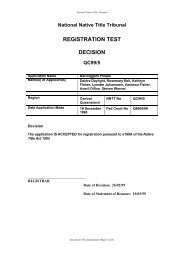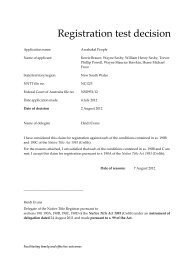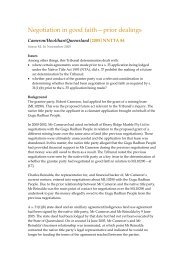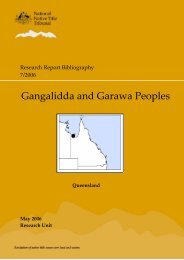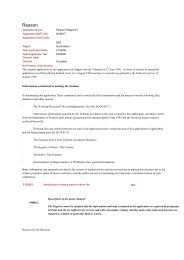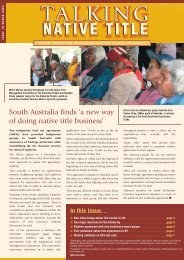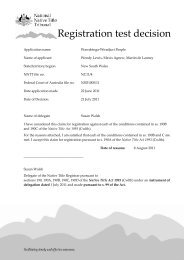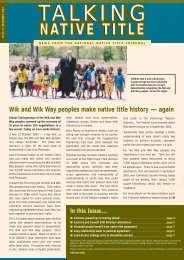Pastoral Agreements: Content Ideas - National Native Title Tribunal
Pastoral Agreements: Content Ideas - National Native Title Tribunal
Pastoral Agreements: Content Ideas - National Native Title Tribunal
Create successful ePaper yourself
Turn your PDF publications into a flip-book with our unique Google optimized e-Paper software.
<strong>National</strong> <strong>Native</strong> <strong>Title</strong> <strong>Tribunal</strong> - <strong>Pastoral</strong> <strong>Agreements</strong><br />
Part 1. Key Themes<br />
<strong>Pastoral</strong> agreements<br />
Introduction<br />
This guide gives an overview of content ideas for agreements between pastoralists and<br />
native title parties. It provides a series of triggers to help parties canvass important issues<br />
during negotiations. It does not aim to be an exhaustive source of information on pastoral<br />
agreements or what they should include.<br />
Part 1 sets out key themes that have been identified for agreement makers to consider to<br />
ensure agreements are durable or sustainable 1 .<br />
Part 2 lists by topic issues for consideration in the drafting and negotiation of the<br />
agreements. This list is not meant to be exhaustive. Many of the topics will not be<br />
relevant to some agreements, for example they may not apply to a small-scale or single<br />
purpose agreement. However, the topics, although not universally applicable, may be<br />
worth consideration. If they are not applicable, they may be ignored.<br />
Before entering agreement negotiations parties need to be sure about what they want to<br />
achieve. Will so many issues be tied down that meeting the terms of the agreement<br />
becomes onerous or the agreement becomes unworkable Or will things be left up in the<br />
air with no mechanism for resolution Will the native title party be any better off under<br />
the agreement, or would they be better off by simply entering under a pastoral<br />
reservation Parties may wish to consider encouraging the relevant State government to<br />
change the legislation to achieve some of the issues that are often covered in pastoral<br />
agreements. For example included in the recent amendment to the <strong>Pastoral</strong> Land<br />
Management and Conservation Act 1989 (SA) 2 are matters such as land use agreements<br />
binding lessees (assignment), liability, rights of Aboriginal persons, preferential access<br />
for ILUA parties including the right to travel across and camp on pastoral land, a public<br />
register, trespassers, and public access.<br />
The <strong>National</strong> <strong>Native</strong> <strong>Title</strong> <strong>Tribunal</strong> (the <strong>Tribunal</strong>) has a wide range of detailed<br />
information about agreement-making. This guide will be most useful if read in<br />
conjunction with other <strong>Tribunal</strong> publications about the types of agreement parties<br />
consider making.<br />
The <strong>Tribunal</strong> can also provide assistance to parties at all stages of the agreement-making<br />
process. Members, case managers and specialist employees have extensive knowledge<br />
and experience in different types of agreements. Contact the <strong>Tribunal</strong> on Freecall 1800<br />
640 501 for more information or to request assistance.<br />
1 According to Allbrook and Jebb, 'In relation to sustainability of agreements, research to date has tended to<br />
define sustainability in this context as meaning an agreement that brings about lasting positive change in<br />
the broad socio-economic status of Indigenous communities', Malcolm Allbrook and Dr Mary Anne Jebb<br />
2004, Implementation and Resourcing of <strong>Native</strong> <strong>Title</strong> and Related <strong>Agreements</strong>, NNTT, Perth, page 2.<br />
Other parties may view sustainability differently.<br />
2 <strong>Pastoral</strong> Land Management and Conservation Act 1989 (SA) Division 2A and 3.<br />
5


